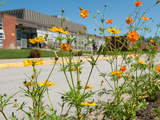This story first appeared on news.umbc.edu and was written by Sarah Hansen.
Scientists and the public have long known that ecosystems like coral reefs and rainforests harbor an impressive array of species, from algae to armadillos. How biodiversity changes over time, however, is much less understood.
Chris Swan, professor of geography and environmental systems, and colleagues will tackle that question with a new research project funded by the National Science Foundation (NSF). The team hopes to reveal how changes in biodiversity might relate to environmental disturbances such as hurricanes, intense drought, or the introduction of invasive species.
Understanding the relationship between biodiversity and environmental change could inform conservation efforts, and there are numerous uses for this knowledge beyond preserving biodiversity for its own sake.
“Biodiversity is the foundation for ecosystem services,” says Swan, “so biodiversity is important to prevent loss of those services.” “Ecosystem services” include pollination of crops by insects and birds, carbon sequestration by vegetation, and water filtration by oysters and mussels. By highlighting these connections between biodiversity and areas like food production, energy, and water quality, Swan explains, he and fellow researchers “hope to elevate people’s understanding of the importance of biodiversity.”
Rather than collecting new data, the team is “synthesizing reams and reams and reams of data” that already exist, Swan says. He expects this large-scale analysis to reveal themes indicating how biodiversity shifts in response to environmental changes over time.
The team includes Swan, two additional principal investigators, and 12 more researchers. They will synthesize 37 data sets that include anywhere from 12 to 37 years of data each. The data come from Long Term Ecological Research (LTER) Network sites, and include locations all over North America as well as the Antarctic and Arctic. Sites cover every type of ecosystem and focus on different kinds of organisms, from plants to worms to fish to mammals.
The project will consolidate the datasets into a single large-scale searchable database accessible to the public. Other researchers will have access to the computer code the team will develop to analyze the data, which they can apply to other datasets in future research.
The team will conduct its analyses at the National Center for Ecological Analysis and Synthesis (NCEAS), located at the University of California, Santa Barbara. NCEAS offers massive computing power, meeting space, and IT staff free of charge to research groups selected in a competitive process. Swan’s proposal was one of only three selected nationwide in the last round. The NSF funding will support the researchers’ travel to Santa Barbara for several working group sessions over the next two years.
This is UMBC’s first opportunity to use NCEAS resources. By analyzing so much data, Swan plans to answer “some very big questions…about what’s happening over time” in Earth’s complex ecosystems.
Image: One of Chris Swan’s research sites in MD; by Marlayna Demond ’11 for UMBC.
Tags:
Posted: July 8, 2016, 6:59 PM
